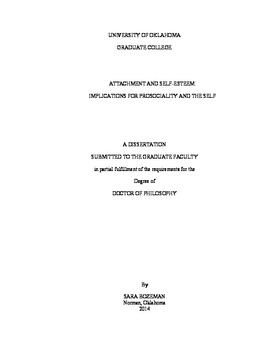| dc.contributor.advisor | Showers, Carolin | |
| dc.contributor.author | Bozeman, Sara | |
| dc.date.accessioned | 2014-12-02T16:16:49Z | |
| dc.date.available | 2014-12-02T16:16:49Z | |
| dc.date.issued | 2014-12 | |
| dc.identifier.uri | https://hdl.handle.net/11244/13635 | |
| dc.description.abstract | Two experimental studies test a model of prosociality (including prosocial actions and emotions) that integrates research from the areas of attachment theory and self-esteem. The model suggests that primed relationship quality and trait self-esteem interact to predict meaningful differences in prosocial responses across a variety of contexts. Study 1 tests the proposed model and finds support for four paths to prosociality: 1. Transcendent: High self-esteem individuals primed with relationship security (secure-HSE) become less focused on egoistic concerns and focus on the welfare of others, but only if the target is worthy; 2. Self-Affirmed: Low self-esteem individuals primed with relationship security (secure-LSE) become especially responsive towards less deserving others; 3. Defensive: High self-esteem individuals primed with relationship insecurity (insecure-HSE) ignore threatening situations, thus becoming unresponsive to prosocial situations; and 4. Self-Protective: Low self-esteem individuals primed with relationship insecurity (insecure-LSE) experience self-focused negative emotions, but are not motivated to behave prosocially. Study 2 aims to link defensive responses to victims with an individual’s cognitive structure of negative self-beliefs. Although Study 2 fails to find a significant relationship between organization of self-beliefs and prosociality, the data support the transcendent path, such that secure-HSE participants are most willing to donate money and are least distressed following a disagreement with a friend. Study 3 provides supplementary analyses of the relationship descriptions for HSE and LSE individuals. Results suggest that HSE and LSE individuals provide different responses to relationship primes, such that HSE individuals write about more long lasting secure relationships and less emotionally distressing insecure relationships compared to individuals with LSE. | en_US |
| dc.language | en_US | en_US |
| dc.subject | attachment | en_US |
| dc.subject | self-esteem | en_US |
| dc.subject | prosocial behavior | en_US |
| dc.subject | self-structure | en_US |
| dc.title | ATTACHMENT AND SELF-ESTEEM: IMPLICATIONS FOR PROSOCIALITY AND THE SELF | en_US |
| dc.contributor.committeeMember | Carvallo, Mauricio | |
| dc.contributor.committeeMember | Song, Hairong | |
| dc.contributor.committeeMember | Terry, Robert | |
| dc.contributor.committeeMember | McWhirter, Paula | |
| dc.date.manuscript | 2014-11 | |
| dc.thesis.degree | Ph.D. | en_US |
| ou.group | College of Arts and Sciences::Department of Psychology | en_US |
